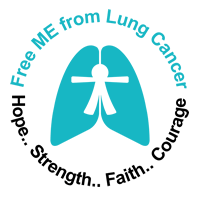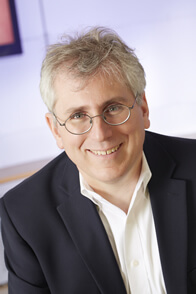Geoffrey I. Shapiro, MD, PhD
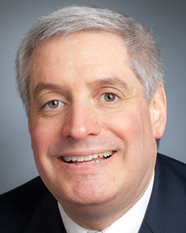
Dr. Shapiro received his PhD in 1987 and his MD in 1988 from Cornell University, followed by postgraduate training in internal medicine at Beth Israel Hospital, Boston, where he served as a chief medical resident. He completed a fellowship in medical oncology at Dana-Farber Cancer Institute, during which he investigated the role of cell-cycle-related proteins in lung cancer. He joined the Dana-Farber faculty in 1994. He is currently an Associate Professor of Medicine at Harvard Medical School and the Dana-Farber. He serves as the Director of the Early Drug Development Center, where Phase 1 and proof-of-mechanism trials are conducted. He is also a member of Dana-Farber’s Thoracic Oncology Program and a member of the Dana-Farber/Harvard Cancer Center SPORE (Specialized Program of Research Excellence) in Lung Cancer.
David P. Carbone, MD, PhD Professor of Medicine, Director, James Thoracic Center – Ohio State University
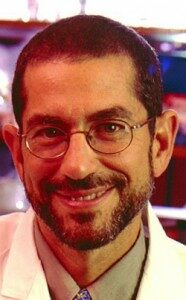
David Carbone graduated summa cum laude from Amherst College in 1977 and received an MD and a PhD in Molecular Biology and Genetics at Johns Hopkins University in 1985. He then did an Internal Medicine internship and residency at The Johns Hopkins Hospital through 1988 followed by a Medical Oncology fellowship at the National Cancer Institute in Bethesda, MD. In 1991 he was appointed Assistant Professor at the University of Texas Southwestern Medical Center and was promoted to Associate Professor with tenure in 1995. He was recruited to Vanderbilt University in 1996 where he was promoted to full Professor in 1998. He is currently a Professor of Medicine, Cell Biology, and Cancer Biology at the Vanderbilt University Medical Center and Director of the Thoracic/Head and Neck Cancer Program at the Vanderbilt-Ingram Cancer Center. He is also Director and Principal Investigator of the Vanderbilt Specialized Program of Research Excellence (SPORE) in Lung Cancer and the Strategic Partnering to Evaluate Cancer Signatures UO1 consortium. His research interests, grant support, and publications have been focused on lung cancer, and specifically proteomic and expression array signature development, lung cancer genetics, cancer immunotherapy, tumor-associated immunosuppression mechanisms and gene therapy. Recent research directions include molecular profiling of lung cancers and preneoplasias, especially the use of mass spectrometry-based proteomics. He as over 150 peer-reviewed publications and review articles, has served on several NCI grant review panels, including the clinical program project parent committee, and has continuous NCI funding since early in his career. He has served on organizing committees for both ASCO and AACR and the Board of Scientific Counselors for the NCI, is currently Chair of the Lung Biology subcommittee for the Eastern Cooperative Oncology Group and on the Board of Directors of the International Association for the Study of Lung Cancer (IASLC).
Takeshi Shimamura, PhD
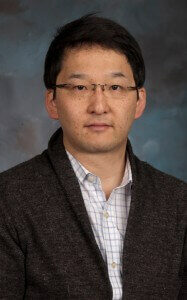
Dr. Shimamura received his Ph.D. from Western Michigan University, Kalamazoo Michigan. Dr. Shimamura’s postdoctoral work was conducted in the laboratory of Dr. Geoffrey I. Shapiro at the Dana-Farber Cancer Institute from 2004 to 2008, where he studied targeted-therapies and resistance mechanisms in the treatment for non-small cell lung cancer (NSCLC). In 2008, he was promoted to an Instructor in Medicine at Dana-Farber Cancer Institute. Following his active participation in Dana-Farber/Harvard Cancer Center Lung SPORE program, he joined the faculty of the Oncology Institute at Loyola University of Chicago Stritch School of Medicine in late 2011. His primary research interest is in the area of signaling pathways of NSCLC and small-cell lung cancer (SCLC) undergoing epithelial to mesenchymal transition (EMT). He now serves as a mentor for many graduate and medical school students who want to pursue careers in lung cancer research.
H. Dean Hosgood, III, PhD, MPH
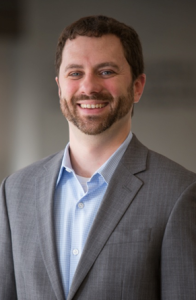
Dr. Hosgood was recruited to the Albert Einstein College of Medicine in May 2012, after being a Post-Doctoral Fellow and Research Fellow at the National Cancer Institute (NCI), in the Occupational and Environmental Epidemiology Branch of the Division of Cancer Epidemiology and Genetics. Throughout his transition from the NIH-Intramural system to the extramural system at Einstein, he has continued his productive research career, which is focused primarily on cancer susceptibility in populations with unique exposures.
Dr. Hosgood’s main research has focused on inter-individual variations of cancer susceptibility associated with environmental (and occupational) exposures. To accomplish this, he utilizes advanced molecular epidemiological methods that integrate cutting edge environmental exposure assessment data with biomarkers of susceptibility (i.e., genetic data) to elucidate the complex mechanisms underlying tumorigenesis. He is involved in several consortia and large-scale case-control and cohort studies evaluating the risk factors of lung cancer. His research has led to over 140 peer-reviewed publications to date.
Dr. Hosgood’s research includes populations who are at higher risk for lung cancer relative to the general population. He has worked extensively on lung cancer among never smokers, which is etiologically and genetically distinct from lung cancer attributed to tobacco smoking. He has expanded on experimental and epidemiological evidence that genetic variation and other intermediate endpoint biomarkers (i.e., microbiome, telomere length, mitochondrial DNA copy number) influence lung cancer susceptibility in populations with exposure to combustion-derived byproducts from solid fuel use (i.e. coal and wood for heating). He is also researching the modification of the National Lung Screening Trial (NLST) guidelines to additional populations who are at high risk of developing lung cancer but do not meet the NLST eligibility criteria. Dr. Hosgood’s research seeks to provide novel insights for environmental carcinogenesis research, as well as that of the etiology of never-smoking lung cancer, which is the 6th leading cause of cancer deaths in the United States.
Associate Professor, Department of Epidemiology and Population Health, Albert Einstein College of Medicine; Associate Director for Population and Clinical Sciences, Clinical Research Training Program; Director, Global Environmental Health, Global Health Center; Member, Cancer Epidemiology Program, Albert Einstein Cancer Center.
Matthew Meyerson, MD, PhD
Matthew Meyerson joined the Dana-Farber and Harvard Medical School faculty in 1998, with the goal of using genomic approaches to discover the causes of human diseases, particularly lung cancer. In 2004, the Meyerson laboratory, working in collaboration with Dana-Farber colleagues Bill Sellers, Pasi Jänne, Bruce Johnson and others, discovered that recurrent mutations in the epidermal growth factor receptor gene, EGFR, in lung adenocarcinoma, dictated the clinical response to EGFR kinase inhibitors including erlotinib and gefitinib. This finding was corroborated by parallel observations from the Haber and Varmus groups and was a harbinger of today’s precision medicine approach to cancer care whereby cancer treatment can be targeted directly to each cancer’s unique molecular profile.
Dr. Meyerson’s group has since made many major genome discoveries in human lung cancer. The Meyerson laboratory has also pioneered many experimental and computational methods in cancer genomics, including cutting-edge methods for sequence analysis of single-cell cancer genomes, analysis of circulating tumor DNA in patient blood samples, and for the discovery of disease-causing pathogens by analysis of human tissue DNA.
In addition to serving as Professor of Pathology at Harvard Medical School and Dana-Farber, Dr. Meyerson has served as director of the Center for Cancer Genome Discovery since 2005, where he spearheaded the development of the “Profile” test for cancer genome analysis that is now routinely offered to all patients at Dana-Farber. From 2015, he also serves as director of the expanded PROFILE program at DFCI, with a renewed focus on continuous integration of genomic discoveries into the test and its rapid clinical translation. In 2010, Dr. Meyerson, along with Drs. Todd Golub, Eric Lander, and Levi Garraway, created Foundation Medicine, a cancer genome diagnostics company that has grown into one of the world’s leading companies dedicated to applying precision medicine approaches to cancer care.
Dr. Meyerson has received numerous honors for his contributions to cancer research, including the Paul Marks Prize in Cancer Research, the AACR Team Science Award, a Research Professor Award from the American Cancer Society, the Outstanding Investigator Award from the National Cancer Institute and the Han-Mo Koo Award from the Van Andel Research Institute, among others. Based on the impact of his research contributions, Thomson Reuters ranked him among the top ten most influential scientific minds in the world in 2014 and 2015, across all major scientific disciplines.
American Cancer Society Research Professor, Professor of Pathology, Dana-Farber Cancer Institute/Harvard Medical School, Director, Center for Cancer Genome Discovery, Dana-Farber Cancer Institute, Institute Member, Broad Institute
